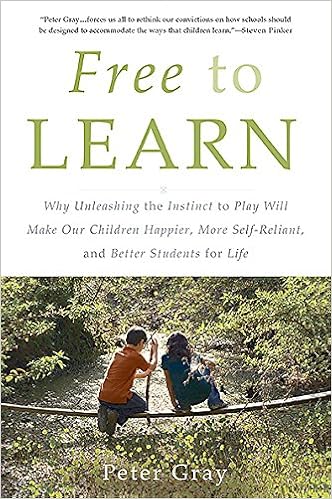I'm starting a new book for reading and reflecting--Free to Learn by Peter Gray.
I've read some quotes and references to this book. And it must be popular because I had to wait to get it from the library.
I read the prologue - and decided that it is exactly the book for me to read.
Peter Gray writes, "Children come into the world burning to learn and genetically programmed with extraordinary capacities for learning. They are little learning machines." They learn to walk and run and move in all kinds of ways. They learn to understand what people are saying to them...and learn how to respond back in kind. They learn to use language to gain knowledge or express their own ideas. (They even learn to have their own ideas!) They engage with the world around them and absorb knowledge and skills through their interactions and play.
But, something happens along the way. He writes, "Nature does not turn off this enormous desire and capacity to learn when children turn five or six. We turn it off with our coercive system of schooling." The way we do school causes many (most? all?) kids to begin to dislike "learning."
Peter Gray's experiences with his own son affected him and his research. He began to explore learning and examine other types of schooling (such as un-schooling). He gained insights in using play and maintaining the "joys of childhood" was possible in the education process.
I'm looking forward to reading this book - seeing what he says and how it both supports and challenges my own ideas about play and learning.
Here's the line-up.
1 - What Have We Done to Childhood?
2 - The Play-Filled Lives of Hunter-Gatherer Children
3 - Why Schools Are What They Are: A Brief History of Education
4 - Seven Sins of Our System of Forced Education
5 - Lessons from Sudbury Valley: Mother Nature Can Prevail in Modern Times
6 - The Human Educative Instincts
7 - The Playful State of Mind
8 - The Role of Play in Social and Emotional Development
9 - Free Age Mixing: A Key Ingredient for Children's Capacity for Self-Education
10 - Trustful Parenting in Our Modern World
Final Reflections


